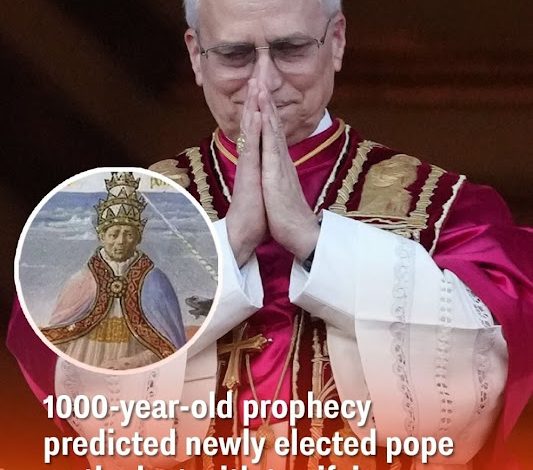Ancient Prophecy Claims New Pope Could Be the Last – With Ominous Warning for Humanity

Throughout history, humanity has been fascinated by prophecies—mysterious predictions that claim to reveal the future of civilizations, leaders, and even the world itself. Among these is the enigmatic Prophecy of the Popes , attributed to Saint Malachy, a 12th-century Irish archbishop. This ancient prophecy has resurfaced in recent years, sparking renewed interest as the Catholic Church undergoes transformations. Some believe it ominously suggests that the next pope—or the current one—could be the final pontiff, heralding profound changes for humanity.
The Prophecy of the Popes: What Is It?
The Prophecy of the Popes consists of a series of cryptic Latin phrases, each allegedly describing a pope’s reign in symbolic terms. According to legend, Saint Malachy received this vision in 1139 during a pilgrimage to Rome. The prophecy lists 112 popes, beginning with Celestine II in the 12th century and ending with a chilling prediction about the “final pope.”
The last entry in the prophecy refers to “Petrus Romanus” (Peter the Roman), who is described as overseeing the ultimate trial of the Church before its destruction or transformation. This ominous conclusion has led many to speculate whether we are witnessing the fulfillment of this centuries-old prophecy today.
Could the Next Pope Be the Last?
As of now, Pope Francis holds the papacy, and some interpreters claim his tenure aligns closely with descriptions within the prophecy. Others argue that if he steps down or passes away, his successor may fulfill the role of Petrus Romanus. Whether or not you believe in such predictions, several factors have fueled speculation:
- Global Challenges Facing the Church: From declining membership in Western nations to scandals and internal divisions, the modern Catholic Church faces unprecedented challenges. Critics see parallels between these struggles and the prophecy’s warnings of tribulation.
- Signs of Change: Pope Francis has broken traditions and embraced reforms, which some interpret as signs of an impending shift in the Church’s structure or mission.
- End-Times Symbolism: Many religious texts, including the Bible, speak of apocalyptic events tied to moral decay, natural disasters, and societal collapse. These themes resonate with the prophecy’s ominous tone.
Ominous Warnings for Humanity
If the prophecy holds true, what does it mean for humanity? Here are some interpretations based on historical analysis and theological perspectives:
1. A Time of Great Tribulation
- The prophecy foretells widespread suffering, both spiritually and physically. Natural disasters, wars, and plagues could escalate, testing humanity’s resilience and faith.
- Some suggest this period will coincide with a global reckoning—a moment when humanity must confront its choices regarding morality, technology, and environmental stewardship.
2. The Fall or Transformation of the Church
- Rather than literal destruction, some scholars propose the prophecy hints at a radical reformation of the Catholic Church. This might involve decentralization, unification with other Christian denominations, or a spiritual awakening among believers.
3. Return to Faith or Secular Decline
- Depending on one’s perspective, the prophecy either warns of humanity abandoning faith entirely or calls for a return to spiritual roots. In either case, it underscores the importance of collective values and ethical leadership.
4. An Era of Hope Amid Darkness
- Despite its dire tone, the prophecy also hints at redemption. After the trials come triumphs—a new era marked by peace, unity, and divine intervention.
Skepticism Surrounding the Prophecy
While intriguing, the Prophecy of the Popes remains controversial. Many historians dismiss it as a medieval forgery created in the 16th century to influence papal politics. There’s no definitive proof that Saint Malachy authored the text, and skeptics point out that vague phrases can easily be retrofitted to match historical events.
Even so, the prophecy continues to captivate imaginations because it taps into universal fears and hopes about the future. For believers, it serves as a reminder to live virtuously; for skeptics, it’s a fascinating artifact of human storytelling.
What Should We Take Away?
Regardless of whether the prophecy holds merit, it raises important questions about our world today:
- Are we prepared for large-scale crises—whether environmental, social, or spiritual?
- How can institutions like the Church adapt to meet the needs of a rapidly changing society?
- What lessons can we learn from history to navigate uncertainty?
Ultimately, the Prophecy of the Popes invites reflection rather than fear. Whether viewed through a religious lens or purely as a cultural phenomenon, it reminds us that every generation grapples with existential questions—and seeks meaning amid chaos.
Final Thoughts
The notion that the next pope could be the last carries undeniable weight, especially in times of global turmoil. While the authenticity of the Prophecy of the Popes remains debatable, its enduring allure lies in its ability to provoke thought and introspection. Perhaps the real message isn’t about doom but about renewal—an opportunity for humanity to unite, grow stronger, and face whatever challenges lie ahead with courage and hope.
So, whether you’re a skeptic, a believer, or simply curious, one thing is certain: the future unfolds not just in prophecies, but in the actions and choices we make today




